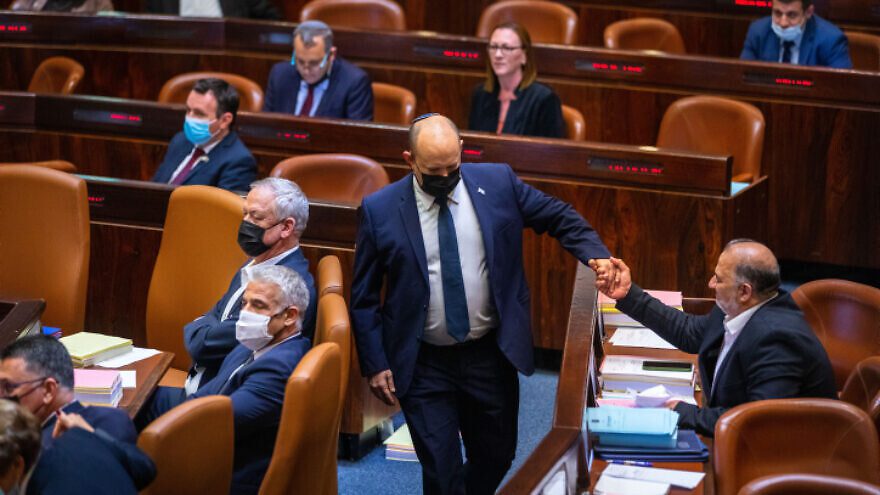An interview by Channel 12 News on Tuesday night with Ra’am Chairman MK Mansour Abbas shocked many, not only for what he said but also for the statements he refused to make. The interview with host Danny Kushmaro delved into the coalition member’s meeting with Jordanian King Abdullah II. Abbas’ description of the meeting with the Hashemite ruler of Jordan was decidedly evasive.
“In a meeting, you say many things,” Abbas said. “It was an introductory meeting. Jordan holds a great value for the region but also to us, the Arab citizens of the state. Thousands of Israeli-Arab students study in Jordanian universities, and, of course, the entity that organizes the annual pilgrimage to Mecca is Jordan.”
Israeli media reports claimed that at the meeting with Abbas, King Abdullah expressed support for a “two-state solution” that would create a Palestinian state inside Israel, ethnically cleansed of Jews, with its capital in Jerusalem. This was the first time that King Abdullah II met with an Arab who was a sitting member of the Knesset. In theory, the Hashemite rulers of Jordan, originally from the ruling family in Saudi Arabia, are at odds with the Islamist factions. In order to establish credibility, Palestinian nationalism seeks dominance over the Temple Mount despite the site having no relevance to Islam. The Jordanian king was granted custodianship of the Temple Mount in a peace agreement signed with Israel in 1994. In 2013, an agreement between Jordan and the Palestinian Authority recognized Jordan’s role.
“I was elected to promote the agenda of Israeli Arabs, and I still stick to this mission. All our international meetings and there have been many, with ambassadors, US Congress members – are coordinated with the prime minister and foreign minister. I do not use the international arena for attacks against Israel.”
Panelist Amit Segal asked him if he intended to respond to overtures made by Palestinian Authority President Mahmoud Abbas. Again, Mansour Abbas was evasive, refusing to give a definitive answer.
“What I’m learning here, Amit, is that if I meet him it causes a storm, and if I don’t meet him it also causes a storm,” Mansour Abbas answered.
Segal tried a different approach, asking incongruously “Is Ra’am’s position that there was a Jewish Temple on the Temple Mount?”
“Amit, you want to open up the history books and discuss history?” Abbas said. “We’ll do it some other time.”
Segal persisted. Abbas insisted that the ‘status quo’ should be maintained.
“Until now, the Israeli government, including Benjamin Netanyahu, has emphasized the issue of Israel maintaining the status quo in the Al-Aqsa Mosque,” Abbas said. “But it should be noted that almost all the incidents, escalations, and deterioration in recent years, are against the background of al-Aqsa Mosque incidents.”
“Gentlemen, we are dealing here with a dangerous and explosive issue,” Abbas demurred. “History has taught us not to play games with these issues. The Al Aqsa mosque is a place of prayer for the Muslims, and the Jews pray to God at the Western Wall. I think it’s a proper arrangement at this stage.”
Mansour Abbas’ implied refutation of the historicity of the Bible and the archaeological evidence of a Jewish Temple in Jerusalem is a standard talking point for Palestinian leaders. In 2000, President Bill Clinton hosted Yasser Arafat and Ehud Barak at Camp David. Dennis Rossa key negotiator at the summit recalled in his book that when the subject of Jerusalem came up, President Clinton cited the religious significance of the Temple Mount to the Jews. Arafat rejected the claim, insisting that Solomon’s Temple had never stood in Jerusalem. The head of the Palestinian Liberation Organization (PLO) suggested that a similar structure may have once existed in Shechem (Nablus). His unreasoning intransigence infuriated the President of the US. The negotiations broke down and a few weeks later, the second intifada began.
A recent television exposé claimed connections between Hamas and members of the Ra’am party via a Palestinian humanitarian organization that is now suspected of funneling funds to the families of terrorists.




